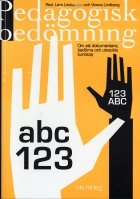Om Sveriges förberedande utbildningsstandard innan den högre utbildningen
Sverige sedan 1994-års ''Friskolereform'' (Korporativa skolor = Privata juridiska personer) som baseras på ''skolpeng-systemet'' (offentlig finansiering) Nationella kursplaner jämte skollag (Värdegrundsbaserad) utbildningsimplementering.
Svensk utbildning har politiserats och likriktats (demokratiska reformer kallades det genom 1946-års skolkommision, gällande Grundskolans tillkomst genom Enhetsskolans försöksverksamhet sedan 1950) på ett sätt som inte är önskvärt någonstans. Gymnasiet Naturvetenskaplig och Tekniska grenar 1965-års reform och motsvarande Tekniska grenar av fackskolan, som sedan sorterades i Gymnasieskolan från 1971 höll ju en Standard som gav Sverige en konkurrenskraftig position före den högre utbildningen påbörjades med förkunskaper.
USA har ju en 'AP'-kursplan där blivande universitetsstuderande kan läsa exempelvis Calculus AB (mindre kurs) Calculus BA (större kurs) som motsvar förkunskaperna.
Hur kan en befolkning låta detta ske?
Hur kan man motivera i Sverige att exempelvis ''byggnadsingenjör'' (en av fyra tekniska grenar) på tekniskt läroverk (Teknisk Gymnasium, Teknisk fackskola) avskaffas i denna utbildningform (Gymnasieskolan) och flyttas till tertiära utbildningsstadiet? Högre utbildning efter 3 år i förberedande (Mellaningenjör 2 år 1990-talet, senast Högskoleingenjör 3 år) program (sedan 1994-års reform) ny 3-årig program 'Gymnasieskola' (där sedan 2011-års reform, kurserna 3, 4, 5 i matematik är gymnasieskolans Standard på innehållet. Förkunskaperna till Högskoleingenjör Jönköping (byggnad) är dock bara Matematik 3c (NA/Tekniska profilen). Så man läser ju högskolematematik med lägre krav på förkunskaper än vad man kunde ha gjort med äldre upplägg (kortare studietid) och utan Studielån för studier på 4-årig teknisk linje (1966-1992).
Byggnadsteknologin som ingår i civilingenjörsutbildningen (Väg-och vatten) är ju då naturligtvis (eftergymnasial) högre grad av specialisering än vad som gällde 4-årig gymnasieskola. Tekniska hjälpmedel (i jämförelse med tidigare årtionden) såsom beräkningsprogram och ritningsframtagning (CAD) har ju underlättat standardbreräkningar som förekommer vid förberedelsen av uppförandet av byggnader.
Main Differences Between Public and Private Schools in the UK
If you have not yet made your mind up about what route to take, you are probably asking wondering exactly what are the differences between public and private schools in the UK.
A private school refers to any school that is not funded by the state, instead, it is mostly financed via school fees paid by parents.
They cater for any age group and fees differ greatly. In the UK, all independent schools are considered private schools, and these terms are often used interchangeably. However, independent schools are technically all overseen by a board of governors or trustees, whereas other private schools may be run by their owner with no governing body.
A very interesting yet confusing fact about the UK school system is that the oldest, most traditional and expensive boarding secondary schools are also called “public schools”. For instance, Eton, the preferred school for the Royals, is an independent boys’ boarding school, which following the public-school tradition, operates a full boarding facility.
So, when trying to figure out the differences between state education and private education in the UK, it is best to not refer to the former as “public” as it may create confusion.
Types of UK State Schools
The state schools in the UK can be divided into the following categories:
- Community schools: they are not influenced by business or religious groups and follow the national curriculum.
- Foundation schools and voluntary schools: funded by the local authority but have a degree of freedom to change the way they operate (they are sometimes supported by representatives from religious groups).
- Academies and free schools: run by not-for-profit academy trusts and are independent from the local authority (they have more freedom to decide on how to operate and are allowed to follow a different curriculum).
- Grammar schools: they can be run by the local authority, a foundation body or an academy trust, and select their pupils based on academic ability. Students have to take a test in order to get in.
Are Private Schools Better than State Schools in the UK?
Alternatively, private schools (also known in the UK as ‘independent schools’), charge a fee rather than being funded by the government. Nonetheless, they must be registered with the government and submit to regular inspections. In these schools, students do not have to follow the national curriculum.
The magic question is, are they better than state schools? There is a lot of debate around this topic, but to give you an idea, people who argue in favor of private schools claim that they tend to have better facilities, better exam results, ample range of extra-curricular activities, and even more highly-committed teachers. Nevertheless, this is all debatable as money can’t always guarantee quality. For instance, life skills that are acquired by interacting on daily basis with people of very diverse backgrounds is something that money can’t buy. Moreover, many times the quality of teaching is down to the teacher and not the school, and in the UK, there are excellent teachers in both systems.

